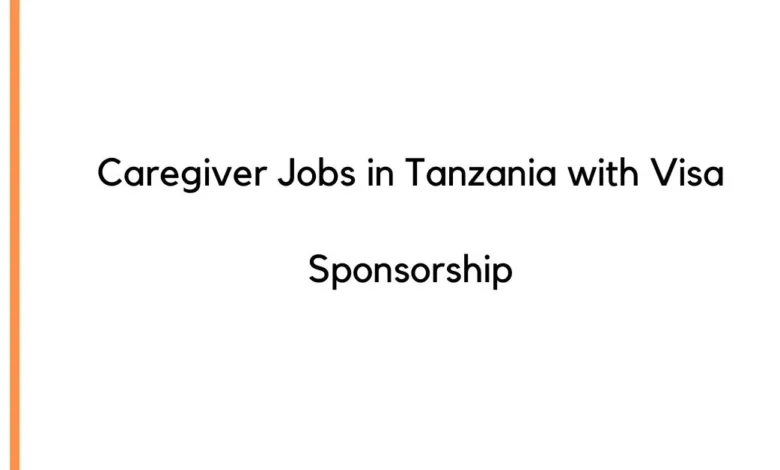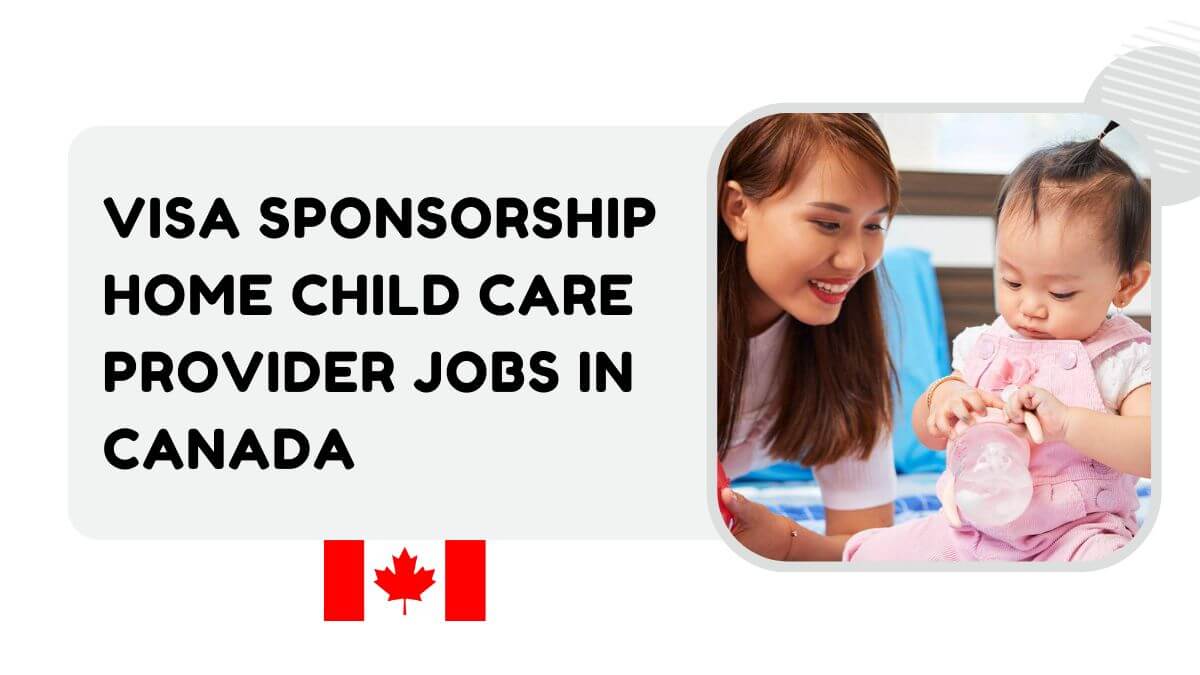Caregiver Jobs in Tanzania with Visa Sponsorship

Tanzania is one of the world’s poorest nations, but its economy is one of the fastest-growing in Africa, and there are chances for people who want to live and work there. Its Health and Social Security System, in particular, is making a concerted effort to modernize and grow by following the example of Western nations.
Tanzania’s primary industry employs about 67% of its workforce, and more than 30% of its GDP comes from agricultural exports. Another quarter of Tanzania’s GDP comes from industry, with the remaining 44% coming from services.
For many years, Tanzania and the United States have worked together to address pressing health issues, emphasizing healthy lifestyles, high-quality integrated services, and strengthened health systems. With an emphasis on effectiveness, efficiency, and accountability, these initiatives promote Tanzania’s dedication to enhancing healthcare services and health outcomes. Programs to address HIV/AIDS, malaria, TB, family planning, reproductive health, nutrition, global health security, and maternity, neonatal, and child health are among the areas in which USAID works with the Tanzanian government.
A large number of positions in the healthcare system, such as those for caregivers/support workers, highly skilled physicians, surgeons, nurses in all specialties, babysitters/au pairs/nannies, etc., have become available as a result of the United States and Tanzania’s cooperative efforts. The United States of America welcomes foreigners from all nations to assist with its welfare programs.
In addition to Tanzanian population centers like Dar es Salaam and Zanzibar, rural Tanzania, which is home to 28% of the nation’s medical workforce and 9% of its doctors, is in dire need of medical personnel. Even if it is not pursued as a permanent employment option, working in a Tanzanian healthcare program financed by USAID is a far better career choice because the country is impoverished and working in the local healthcare industry won’t help you much! Let’s begin by going over all there is to know about USAID-sponsored caregiver jobs in Tanzania with visa sponsorship.
Details of Caregiver Jobs in Tanzania with Visa Sponsorship
Visa/Immigration Requirements
The proper work permit would normally come under Class B for foreigners working as caregivers in Tanzania. Here’s how to handle the immigration and visa requirements:
1. Class B Work Permit
This pertains to foreign workers who hold skilled jobs in Tanzanian businesses, such as caregivers, if the occupation calls for particular training and credentials. A caregiver position is typically seen as a specialist employment that calls for a Class B work permit if it entails caring for children, the elderly, or people with disabilities.
2. Job Offer from a Tanzanian Employer
- In Tanzania, you need to obtain a work offer from an employer.
- With proof of the position’s opening and your suitability for it, your company will apply for the work visa on your behalf.
- The employer must prove that no Tanzanian national with the necessary qualifications is available for the job.
3. Qualifications and Experience
- Usually, relevant social work, healthcare, or caregiving certifications or credentials are needed. These could consist of:
- a nursing, social work, or healthcare-related diploma or degree.
- relevant experience providing care.
- Your company might have to defend your experience or the particular abilities you bring to the position if you lack official qualifications.
4. Health and Character Requirements
- Medical Examination: To verify your suitability for a caring position, you could be required to present a health certificate.
- Police Clearance: To demonstrate that you have no significant criminal history, a background investigation may be necessary. Clearance: A background check may be required to prove you have no serious criminal record.
5. Application Process
- The Tanzanian Ministry of Home Affairs receives the work permit application from the employer.
- You must apply for a visa at the Tanzanian consulate or embassy in your nation of residence.
- You might have to provide supporting documentation, like
- A valid passport.
- Job offer letter.
- Proof of qualifications.
- Health certificate and police clearance.
6. Duration and Extensions
- Although a Class B work permit is often granted for a year, it may be extended for more years based on your employment contract and visa requirements.
7. Residence Permit
- If you intend to remain in Tanzania for a long time, you might also need to apply for a residence permit in addition to the work permit.
8. Family Dependent Visa
- Family members may need to apply for a dependent visa if you are moving with them.
Education and Experience
Certain academic, experience, and language requirements must be fulfilled for USAID caregiver positions in Tanzania that are sponsored by visas. This is a summary:
1. Education Requirements:
Candidates for carer positions should possess one of the following in order to be eligible:
- Professional Healthcare Degree or Certification:
- Nursing Degree (Bachelor’s or equivalent).Diploma in Caregiving, Social Work, or Childcare.Pediatric Accredited Certification.
2. Experience Requirements:
- Junior Roles (Entry-Level):
- Although it is not required, individuals with some practical experience or internships in social services, healthcare, or caregiving may be given preference.
- In entry-level roles, the emphasis is usually on the candidate’s educational background and eagerness to learn.
- Senior Roles (e.g., Senior Caregiver for Special Needs, Babysitter, Caregiver for VIP Families):
- For these higher-level positions, experience is frequently necessary and highly preferred.
- Prior experience providing care for patients with special needs or in the healthcare industry will be highly regarded.
- It is deemed advantageous to have prior experience working with VIP families or in extremely delicate settings.
3. Language Requirements:
- English Communication Skills:
- Because the program frequently requires interaction with USAID workers and other international partners, proficiency in English is required.
- Speaking English fluently and professionally is essential, particularly when writing reports or talking about care procedures.
- Local Language (Arabic):
- Basic Arabic proficiency is not required, although it will be helpful when interacting with local families who might not speak English well.
- It is advised to learn Arabic to at least a basic conversational level since it would make daily interactions easier.
Benefits
1. Competitive Salary in US Dollars
- Pay in US Dollars: One major benefit of working with USAID in Tanzania is that you will be paid in US dollars. You have more purchasing power thanks to the US dollar to Tanzanian shilling conversion rate, which lowers the cost of daily expenses like food, shopping, and transportation.
- Enhanced Financial Security: Your pay will go a lot farther when you have a strong and stable currency like the USD, especially when compared to local earnings.
2. Cost of Living Advantages
- Affordable Living: You’ll experience a significantly lower cost of living because Tanzanian native currency is weaker than the US dollar. This includes having access to:
- Beautiful parks and zoos
- Arabic street food and delicious local cuisine
- Cheap shopping and travel opportunities within Tanzania
- Reasonably priced lodging is available in expat hotspots like Dar es Salaam, particularly when compared to other regions of the world.
3. Valuable CV Experience
- Prestige of USAID Experience: USAID is a well-known institution throughout the world. It would be like putting a “jewel in the crown” of your profession to include work experience with them on your resume. This might boost your professional profile in the healthcare industry and other relevant industries and open doors to opportunities abroad.
- Career Mobility: Your USAID experience will be highly recognized by future employers, increasing your competitiveness in the global employment market, should you want to leave Tanzania and pursue caregiving or other healthcare professions overseas.
4. Career Advancement in Healthcare
- Prestige of USAID Experience: USAID is a well-known institution throughout the world. It would be like putting a “jewel in the crown” of your profession to include work experience with them on your resume. This might boost your professional profile in the healthcare industry and other relevant industries and open doors to opportunities abroad.
- Career Mobility: Your USAID experience will be highly recognized by future employers, increasing your competitiveness in the global employment market should you want to leave Tanzania and pursue caregiving or other healthcare professions overseas.
5. Exposure to International Healthcare Programs
- Opportunities for Volunteers: There are numerous volunteer healthcare programs in Tanzania, many of which are connected to the United Nations and other international organizations.
- Caregivers with relevant training and experience are frequently accepted into RCP and other independent programs, providing you with the chance to grow your network and skill set in the healthcare industry.
- Additionally, taking part in these programs might improve your resume and open up more volunteer or paid jobs abroad.
Average Salary
On average, If a caregiver has 0–2 years of experience, they are paid $15.48 per hour. As they gain more experience, this number rises. Caregivers receive the same compensation because USAID is a US-based initiative.
The average wage for caregivers in Tanzania is The average compensation for a caregiver in Tanzania is 8,496,400 TZS annually, with the lowest average wage being 4,414,800 TZS and the highest average being 12,958,200 TZS.



